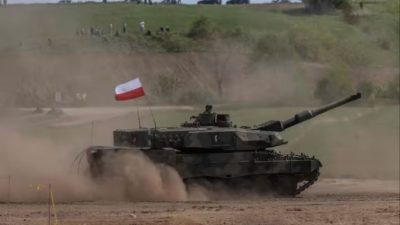Poland Claims Germany Will Face International Isolation If It Does Not Send Tanks to Ukraine

All Global Research articles can be read in 51 languages by activating the Translate Website button below the author’s name.
To receive Global Research’s Daily Newsletter (selected articles), click here.
Follow us on Instagram and Twitter and subscribe to our Telegram Channel. Feel free to repost and share widely Global Research articles.
***
Germany contends with increasing pressure and scrutiny from its so-called European Union and NATO allies to deliver Leopard tanks to Ukraine. However, a fake narrative is also being constructed that Berlin is an international pariah, so-much-so, that it could even face international isolation for not sending the tanks.
“Germany will be in international isolation if it does not allow Leopard tanks to be sent to Ukraine,” Polish Vice Chancellor Arkadiusz Mularczyk said to Polskie Radio. “It must be understood that Germany, by not accepting the shipment of tanks to Ukraine, will find itself in international isolation. If it continues with this position, its position will be very weak.”
This is of course a ridiculous notion since it is actually Poland, and the wider European Union, who are in the global minority of sending weapons to Ukraine and imposing sanctions on Russia.
The expression of willingness by German Foreign Minister Annalena Baerbock on January 22 to approve the shipment of Leopard tanks to Ukraine from other countries is the result of major pressure, including from Poland and the Baltic republics, but especially from the UK and the US.
Polish Deputy Foreign Minister Marcin Przydacz stressed Warsaw’s call for German Chancellor Olaf Scholz to take a position on the supply of Leopard tanks to Ukraine.
“In the legal-formal sense the position of the foreign minister should be sufficient, but taking into account how the discussion inside Germany looks, we would probably have more confidence that the declaration of consent would be considered positive, if this position were also presented by Chancellor Scholz,” Przydacz told Polskie Radio.
Earlier, Polish Prime Minister Mateusz Morawiecki, in an interview to Polsat, stated that Warsaw is ready to send German Leopard tanks to Ukraine without permission from Berlin. He stressed that Poland is ready to form a coalition for the supply of tanks to Ukraine without the participation of Germany if the latter does not approve the shipment of its tanks to Kiev.
On January 21, German Defence Minister Boris Pistorius declared that NATO countries and their allies failed to reach a consensus on the supply of German tanks to Kiev but that Berlin will study its possibility.
Russian Foreign Minister Sergei Lavrov previously warned that any arms shipment to Kiev will become a legitimate target for the Russian military. At the same time, Kremlin spokesman Dmitri Peskov commented that the attempts to saturate Ukraine with weapons will negatively impact the situation and negotiations.
Senior NATO officials met on January 20 at a German military base to discuss — unsuccessfully — a possible new shipment of heavy weapons to Kiev, an issue that has become increasingly acrimonious as time progresses.
For his part, US Defense Secretary Lloyd Austin called on his allies to deepen their support for Ukraine, stressing that “this is not a moment to slow down.”
“It’s time to dig deeper. The Ukrainian people are watching us. The Kremlin is watching us. And history is watching us. So we won’t let up. And we won’t waver in our determination to help Ukraine defend itself from Russia’s imperial aggression,” he added.
However, it is recalled that Washington’s request comes at a time when Germany is refusing to send Leopard tanks to Kiev. Berlin, for its part, has said it will not send tanks unless the US also sends its M1 Abrams tanks to Ukraine.
Germany is facing an immense economic and energy crisis and does not want problems with Russia to deepen. If Germany sends tanks to Ukraine, the country would be even more involved, a prospect it does not want since Russia is a fellow European country that it must deal with, unlike the US which has an entire ocean of separation.
Although Germany has the power to veto any decision to export its Leopard tanks, it has sought a conditional agreement with the US, Reuters reported. According to CNN, the controversy between the two countries occurs in the midst of a much broader debate about whether or not it is a good idea to equip Ukraine with more sophisticated and powerful weapons.
The positions of both countries have generated all kinds of reactions. For example, we recall that Morawiecki asserted that Poland could deliver its Leopard tanks to Ukraine without waiting for German permission.
“We have agreed with our Ukrainian friends and also with our Western European partners that we will hand over these tanks together. The permit is already a secondary issue, we will get it quickly or else we will act as we see fit,” he said to Polsat.
The Russian Foreign Ministry spokeswoman, Maria Zakharova, indicated that the intentions of several Western countries to send Ukraine more weapons are with the aim of “raising the stakes” and will only escalate the conflict.
In this sense, the reluctance to increase weapon deliveries to Ukraine could be interpreted as a sign that Germany wants to re-establish some of the dialogue it lost with Moscow after the departure of Angela Merkel. This is obviously something that Washington categorically does not want to occur. Although the US can count on other European Union countries to arm Ukraine, particularly Poland, no country besides France has the political, industrial, and military power of Germany.
*
Note to readers: Please click the share buttons above. Follow us on Instagram and Twitter and subscribe to our Telegram Channel. Feel free to repost and share widely Global Research articles.
Ahmed Adel is a Cairo-based geopolitics and political economy researcher.
Featured image is from InfoBrics

